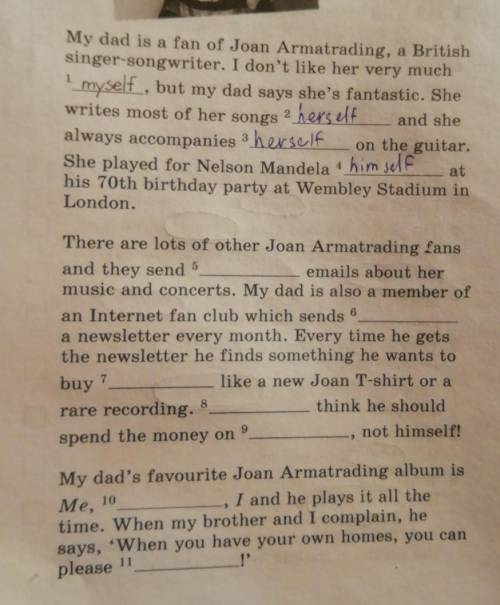Complete the paragraph with reflexie pronouns, pronouns or each other.

Другие вопросы по теме Английский язык
Популярные вопросы
- Даны векторы ab( -4; 0) bc (5; 2) найти сумму l ab + bc l...
2 - Олегу и зое надо разделить между собой 1040 р которые им заплатили за...
1 - Народ, это завтра с утра сдавать ! ) нужно написать сжатое изложение.....
3 - Какими общими чертами представители отряда приматов?...
3 - Сравните политическую систему до перестройки и сложившуюся в результате...
3 - Запишите в стандартном виде 823 97,01 0,0362...
3 - Периметр параллелограмма равен 70 см, а его высоты - 3см и 4см. найти...
3 - Дано ромб авсд. вк высота до стороны ромба. диагональ ас=4√3. найти...
2 - На путь от спортивного лагеря до водопада и обратно группа туристов...
3 - Нужно составить синквейн про брежнева леонида ильича...
3
Here is the paragraph:
Lilly and Tim went on vacation to the beach. ___ enjoyed ___ at the shore. They built sandcastles and swam in the ocean. Then, Lilly remembered that ___ had forgotten ___ towels on the sand. They quickly ran back and found ___ towels where they had left them. They dried ___ off and continued playing. Lilly and Tim always have fun when they spend time with ___.
Now, let's fill in the blanks:
Lilly and Tim went on vacation to the beach. They enjoyed themselves at the shore. They built sandcastles and swam in the ocean. Then, Lilly remembered that they had forgotten their towels on the sand. They quickly ran back and found their towels where they had left them. They dried themselves off and continued playing. Lilly and Tim always have fun when they spend time with each other.
In this paragraph, we used "themselves" as the reflexive pronoun to show that Lilly and Tim enjoyed the beach activities individually. We used "they" as the pronoun to refer to Lilly and Tim collectively. We used "their" to show that the towels belong to Lilly and Tim. And finally, we used "each other" to emphasize the mutual enjoyment when they spend time together.
I hope this explanation helps! Let me know if you have any further questions.